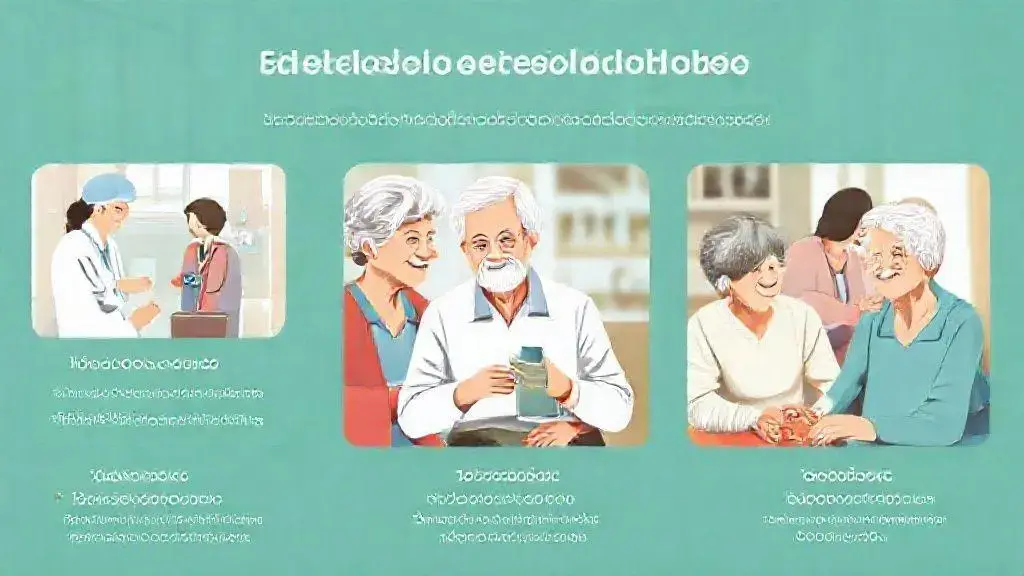Healthcare benefits for senior citizens: what to know

Healthcare benefits for senior citizens include programs like Medicare and Medicaid, providing essential support for medical costs and ensuring access to needed services.
Healthcare benefits for senior citizens play a crucial role in ensuring comfort and well-being in later years. Have you considered how these benefits can support your loved ones? This guide will walk you through essential information.
Understanding healthcare access for seniors
Understanding how to access healthcare is vital for senior citizens. Many wonder how they can navigate the complexities of options available to them. By familiarizing themselves with available resources, seniors can make informed choices regarding their health.
Types of Healthcare Access
For seniors, there are several types of healthcare access options. These include government programs, private insurance, and community resources. Each option presents unique advantages that can cater to different needs.
- Medicare: A federal program providing health coverage for individuals aged 65 and older.
- Medicaid: A state-managed program that assists low-income individuals, including seniors, with medical costs.
- Private Insurance: This includes plans from companies that can offer customized healthcare solutions.
- Community Services: Local organizations often provide health screenings and support services.
Understanding eligibility for these programs can greatly impact a senior’s healthcare journey. For instance, Medicare covers a wide range of services, including hospital stays and routine check-ups. However, not all services are covered, so it’s crucial to read the fine print.
Navigating the Application Process
Applying for healthcare benefits can sometimes seem overwhelming. However, the process can be simplified. Seniors should gather necessary documentation such as proof of identity and income before applying. This preparation can help avoid delays.
Additionally, many resources are available to assist seniors in completing applications. Local senior centers often have staff who understand the application processes and can provide guidance. It’s advisable to reach out for help rather than tackling the application independently.
As seniors learn about their options, they become empowered in their healthcare decisions. Knowledge is key to navigating the healthcare landscape, ensuring they receive the care they deserve.
Types of benefits available for elderly citizens

There are various benefits available for elderly citizens that can significantly improve their quality of life. Understanding these benefits is essential for tapping into the resources that can help with financial, medical, and social needs.
Healthcare Benefits
One primary category of benefits includes healthcare options. Many seniors qualify for Medicare, which provides coverage for hospital stays, doctor visits, and preventive services. This assistance is crucial in managing health as people age.
- Prescription Drug Coverage: Medicare Part D offers help with medication costs.
- Medicaid: For those who need additional support, Medicaid helps cover healthcare expenses and long-term care.
- Supplemental Insurance: Medigap can aid in paying out-of-pocket costs not covered by Medicare.
These healthcare benefits are fundamental, but they are not the only forms of assistance available.
Financial Support Programs
Financial benefits are another significant area to explore. Programs like Social Security provide income to seniors, helping them meet their daily expenses. Many eligible seniors can receive Social Security retirement benefits based on their earnings history.
Furthermore, some states offer supplemental financial benefits that address the living costs of elderly citizens. These programs can help cover essential expenses, ensuring a more comfortable lifestyle.
Community and Social Services
Seniors should also look into community resources that offer various types of support. Many local organizations provide access to social services aimed at enhancing well-being. This might include meal programs, transportation services, and companionship programs to combat loneliness.
- Senior Centers: These facilities often host activities that promote socialization and mental stimulation.
- Meal Delivery Services: Organizations like Meals on Wheels deliver nutritious meals directly to seniors’ homes.
- Transportation Services: Many communities offer rides to medical appointments or social events.
These community services are essential for maintaining a vibrant and active lifestyle as seniors age.
Applying for healthcare benefits: a step-by-step guide
Applying for healthcare benefits can seem daunting, but with a clear step-by-step guide, seniors can navigate the process confidently. It’s important to understand the requirements and gather the necessary documents before starting.
Step 1: Determine Eligibility
The first step is to determine whether you qualify for benefits like Medicare or Medicaid. Eligibility often depends on age, income, and health status. For Medicare, you must be at least 65 or have a qualifying disability.
- Identify your age: Seniors typically qualify at age 65.
- Check your disability status: Some may qualify earlier with specific health conditions.
- Review income guidelines: Programs have income limits for assistance.
Once you have established eligibility, you can move to the next steps.
Step 2: Gather Necessary Documents
Preparing essential documents is crucial for a smooth application process. Common documents include proof of identity, income records, and previous healthcare coverage information. Having everything organized makes the application process easier.
Examples of documents needed:
- Social Security card: This confirms your identity.
- Tax returns or pay stubs: These show your income levels.
- Medical records: Provide information about past treatment and health conditions.
Step 3: Complete the Application
Now that you have all your documents ready, it’s time to complete the application. Most applications can be done online, by mail, or in person. Online applications are usually faster and include helpful prompts to guide you.
Follow these tips when completing the application:
- Fill out all sections: Incomplete applications can delay processing.
- Double-check your information: Ensure that all details are accurate.
- Ask for help: Do not hesitate to seek assistance from family or local organizations.
Once submitted, your application will be reviewed. Keep track of your application status and be prepared to answer any additional questions from the benefits office.
Step 4: Appeals and Follow-Up
If your application is denied, don’t lose hope. You have the right to appeal the decision. Make sure to gather new evidence or clarify any misunderstandings to bolster your case. Always follow up with the benefits office for updates on your application or appeal process as this can help expedite resolution.
Challenges in accessing healthcare benefits and solutions

Accessing healthcare benefits can present several challenges for senior citizens. Understanding these obstacles is essential for finding effective solutions. Many seniors may feel overwhelmed by the complexity of applications or deterred by perceived bureaucratic hurdles.
Common Barriers
There are common barriers that seniors face when trying to access benefits. These can include lack of information, difficulty understanding paperwork, and concern over eligibility. Many elderly individuals might not fully grasp what benefits they qualify for, leading to confusion.
- Information Overload: Seniors often encounter a lot of information that can be hard to process.
- Complex Forms: Application forms may use jargon that confuses seniors, making them hesitant to apply.
- Fear of Judgment: Some seniors worry about the stigma attached to seeking help, which can prevent them from applying.
Identifying these challenges allows seniors and caregivers to seek the right assistance.
Solutions to Access Challenges
Finding solutions to these barriers can make the process smoother. First, education is critical. Providing clear and accessible information about available benefits can empower seniors. Workshops and information sessions hosted by community organizations can serve as valuable resources.
Moreover, simplifying the application process is essential. Organizations should advocate for plain language in forms and instructions to ensure comprehension. Senior centers can also offer hands-on assistance in completing applications, making the experience less intimidating.
Community Support and Resources
Building a support system can significantly enhance access to benefits. Community programs that offer one-on-one consultations can help seniors navigate the healthcare landscape. Volunteers and trained staff can assist with filling out forms and understanding requirements.
- Local Outreach Programs: These initiatives can connect seniors with resources in their area.
- Online Help Centers: Some websites offer step-by-step guidance on benefits applications.
- Peer Mentoring: Senior mentorship programs allow those who have successfully accessed benefits to share experiences and tips.
These measures can help create a more supportive environment for seniors trying to access their healthcare benefits.
In conclusion, accessing healthcare benefits can sometimes be challenging for senior citizens, but understanding the obstacles and finding solutions can greatly improve the process. With resources available to help guide seniors through eligibility checks and application steps, they can confidently attain the benefits they deserve. Community support plays a vital role in assisting seniors, from offering information to providing hands-on help with applications. By encouraging education and simplifying processes, we can create a more inclusive healthcare system for our elderly population.
FAQ – Frequently Asked Questions about Healthcare Benefits for Senior Citizens
What healthcare benefits are available for seniors?
Seniors can access Medicare, Medicaid, and various state programs that provide financial assistance for medical costs.
How can seniors apply for healthcare benefits?
Seniors can apply by checking eligibility, gathering necessary documents, and completing applications online or in person.
What challenges do seniors face when accessing benefits?
Common challenges include complex paperwork, lack of understanding about benefits, and fear of stigma when seeking help.
What resources can help seniors navigate the application process?
Local senior centers, community programs, and online help centers can provide support and guidance throughout the application process.





